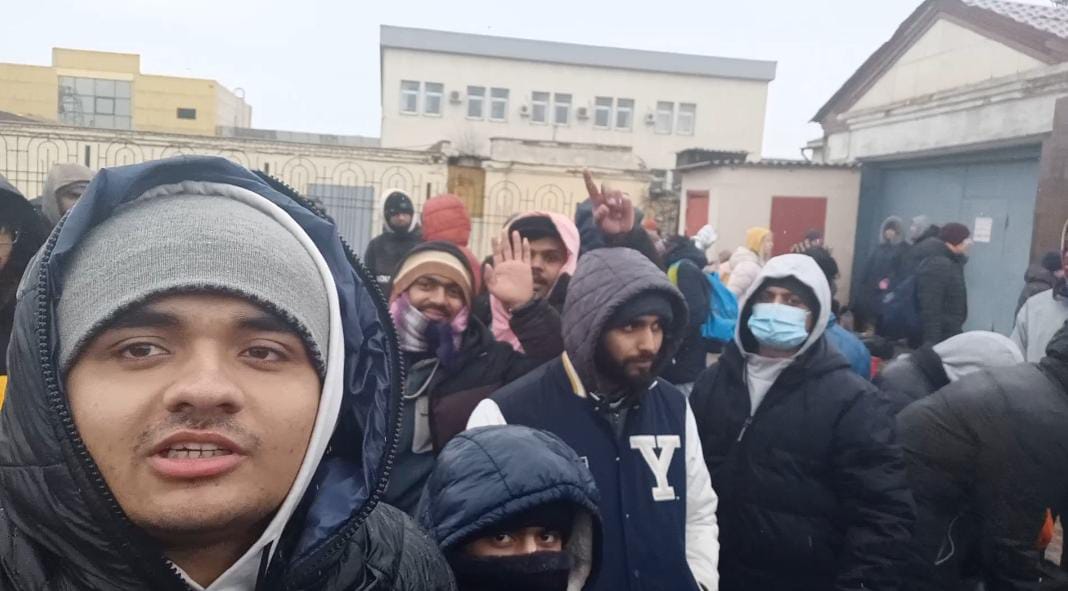After a harrowing journey to get out of war-ravaged Ukraine, Deep Kanabar is back home safe with his parents in India.

“It’s overwhelming, you know. You can’t cry, you can’t laugh, you can’t express anything. It’s just a moment of shock,” he recounted to Global News. “Suddenly, you are with your family — in just a snap.”
For the last four years, the 21-year-old had been studying at the National Aerospace University in Kharkiv, near the Russian border, and living at a hostel for international students. He was pursuing a bachelor’s degree in rocket and space complexes with only two months left.
Students and staff were aware of tensions growing, Kanabar said, but they never expected things to escalate this far.
“It was the 24th of February. I was sleeping when I heard loud knocking on my door, and someone yelling, ‘Wake up!'” he said.
“I was thinking, ‘Who is outside my room at five in the morning?’ Then I looked outside my window and saw a blast.”
Students immediately had to take shelter in a bunker, which is when he said the reality of war kicked in.
“It was like hell. None of us were prepared for it. Everyone was panicking.”
Kanabar said he and around 20 classmates were trapped in the hostel’s rooms for days, helping each other with food and other supplies, as well as motivating one another to stay in good spirits — all while trying to plan how to get out.
When basic necessities such as food and water were running out, he said posted a video on Instagram calling on the Indian government to help with the hashtag, #indiansinukraine.
“After a lot of effort of trying to reach someone, we finally got a call from the Indian embassy,” he said. “They had organized buses for us, but they were outside of Kharkiv. They couldn’t come inside of the city. So now, we had to take matters into our own hands.”

Kanabar said the group packed up their belongings and left for the train station, but with huge crowds of people rushing to get on, they couldn’t get onboard.

Get daily National news
“All the locals were being let on the train, and no one was letting us foreigners board. But we could not go back and be stuck again,” he said.
“I told my friends, ‘I am going now. I will not stay any longer.’ I told them whoever wants to come with me comes, but we have to try. We have to do this for our families. Someone right now is praying for our safety. Our loved ones are wanting to see us again.”
With no other option, Kanabar said he and two classmates set out on foot, heading to the area of Pisochyn in western Kharkiv.
“We went through conflict zones with Ukrainian troops passing by telling us to take cover,” he said. “We barely had any water to drink. We had to do it. It was a tough 20-kilometre journey, but it was the drive in us to live which kept us going.”
Once in Pisochyn, he said they got to a meeting point where several foreign embassies had set up shelter for international students. The rest of his classmates arrived later by taxis, and Kanabar said he slept a little easier that night after reuniting.
The next day, the embassies were able to organize two buses for them to travel to Ternopil, a city more than 900 kilometres away.

“There were about 85 of us all together,” he said. “As happy as I was to keep on moving, that night was frightening. The shelling just sounded deadly. We were all fearful for our lives. Such a strange feeling, because even though we were heading towards safety, things were still so uncertain.”
From Ternopil, the buses took them as close as possible to the Romanian border, and the group walked the roughly five kilometres to get across.
“Then it was a sigh of relief,” he said. “I felt like, ‘Okay, now I can breathe properly.'”
Embassy officials had organized a flight out to Delhi, and Kanabar said he eventually touched down in Surat in the western state of Gujarat. But although he is back with his loved ones, he said, he cannot forget Ukraine.
“That was my home too. I cannot forget that land,” he told Global News. “I can’t forget that view outside of my hostel. From my window, I could see the whole city. I just don’t have words.”
Kanabar said the journey taught him to never take anything for granted again.
“I have seen mothers at the train station hand over their children to unknown people … pleading to keep them safe somewhere. Can you imagine how tough that is? Life can just change in an instant. This should be the learning lesson for all of us.”

For now, he said he stays in touch with his teachers and some of the Ukrainian students who could not escape the war through text messages.
“It makes me realize the best thing you can ever get is love, and the best thing you can ever give is love,” he said.
“I am rooting for them. I pray they make it out safely. If I think about it, I will cry. I can’t explain that feeling of numbness in me. I hope they will be okay.”









Comments
Want to discuss? Please read our Commenting Policy first.